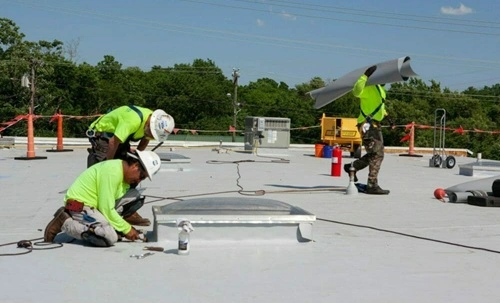Commercial roofing demands more complex problem-solving skills because it has larger surfaces, tougher materials, and tricky drainage systems to deal with. But with those challenges come big rewards.
If you’re already in the field, you’ve likely noticed how your technical skills have sharpened over time. From better pay to long-term career stability, commercial roofing offers solid perks that go beyond the ladder.

Top Reasons to Pursue a Career in Commercial Roofing
1. High in Demand
The global commercial roofing market is expected to grow at a steady rate of 4.5% annually, reaching a value of $16.9 billion by 2027.
This staggering number depicts more job opportunities, higher earning potential, and greater job security for commercial roofing experts. As the market grows, skilled roofers will be in high demand for new construction, upgrades, and maintenance projects across various industries.
2. No Need College Degree Needed
One of the biggest reasons people get into commercial roofing is simple—you don’t need a college degree to start. It’s a trade that values real-world skills over fancy paper. If you’re willing to learn, show up, and put in the work, there’s a place for you.
However, you’d need to get an Illinois roofing license to pursue this career professionally and gauge high-value projects in the long term.
3. Handle a Variety of Projects at a Time
No two days look the same in a roofing career. From dealing with large-scale commercial buildings to tricky weatherproofing challenges, you come across different tasks. They might physically drain you, but the experience you’d get would be priceless.
4. Career Growth and Earning Potential
The more you level up, like learning metal or green roofing, the more you earn. Gain experience, and you’re not just working jobs; you’re leading entire teams on your own.
Even if you’ve started as a laborer, you can grow into a foreman, project manager, or even run your own crew. The career ladder’s there—you just have to climb it.
5. Get On-site Training
Most roofing companies offer on-the-job training, so you’re not expected to know everything on day one. You learn as you go, and yes—you get paid while doing it. That’s a game changer if you’re starting from scratch or trying to support yourself while learning a skill.
6. Solid Job Security
Commercial roofs aren’t built and forgotten. They need regular inspections, repairs, waterproofing, and eventually, full replacements. That means the work is always rolling in. While other industries have layoffs or slow seasons, roofing tends to stay steady—especially if you’re part of a well-established team.
People Also Ask
1. Where do commercial roofers get paid the most?
Commercial roofers earn the highest wages in Alaska, New York, and Illinois. The high demand, union presence, and cost of living boost pay in these areas.
2. Is roofing a stressful job?
Yes, roofing can be stressful due to physical labor and working at heights.
3. What is the biggest problem roofers face?
The biggest problem roofers face is safety risks, especially falls. Bad weather and material shortages also disrupt work.